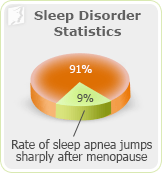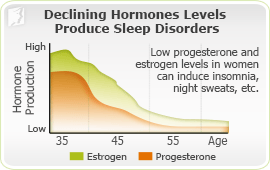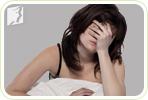
Menopause is a difficult transition for many women. On top of trying to balance work and family life, there are numerous symptoms that can occur, and for some women, menopausal hormonal fluctuations can trigger sleep disorders. By better understanding the causes of sleep disorders, women can find the best treatment options for them and improve their overall quality of sleep.
Read on to learn about the hormonal causes of sleep disorders during menopause.
Hormonal Causes of Sleep Disorders
The primary reason why some women develop sleep disorders during menopause relates to the hormonal fluctuations that are taking place within the body. Declining levels of hormones, specifically of estrogen and progesterone, can affect women in many ways, including triggering sleep disorders. Although hormonal imbalance is the root cause of sleep disorders during menopause, fluctuating hormone levels can create other symptoms, which can also contribute to sleep disorders.
Lower levels of estrogen are associated with other menopause symptoms that may lead to sleep disorders. Decreased estrogen is linked to hot flashes and night sweats, along with an increased incidence of snoring or disturbances in breathing.
Progesterone works to induce sleep, thus with decreased levels in the body, a woman is more prone to insomnia.
Estrogen and progesterone's effects on sleep

As mentioned above, estrogen and progesterone affect sleep, and decreasing levels of either hormone can cause sleep disorders. To the right is a referential chart that shows how these two hormones decrease drastically in a woman's body in the years leading up to menopause.
How a Decline in Estrogen Affects Sleep
- Slows down the intake and secondary production of magnesium, a mineral that helps muscles to relax.
- Linked to hot flashes and night sweats, which interrupt the sleep cycle.
- Linked to sleep apnea, which disturbs breathing during the night.
How a Decline in Progesterone Affects Sleep
- Progesterone has a sleep-inducing effect. When levels decline, one's ability to fall asleep does as well.
- Linked to insomnia, an inability to fall asleep promptly.
These hormonal changes are one significant reason why so many women going through menopause experience sleep disorders. The subject becomes even more complicated when taking into consideration other factors that may influence a woman's ability to sleep. Sleep disorders can also be caused or exacerbated by psychological factors.
Keep reading to learn more about these other potential causes of sleep disorders during menopause.
Psychological Causes of Sleep Disorders
Psychological Disruptions
- Depression
- Anxiety
- Stressful work situations
- Relationship problems
- Financial issues
In addition to the hormonal causes that lead to sleep disorders during menopause, there are also psychological causes that can lead to this menopause symptom. During the years leading up to menopause, a woman typically experiences a great deal of changes in her body, which can lead to feelings of anxiety, depression, and stress. Anxiety is linked to an inability to fall asleep, while depression has been known to cause early morning waking.
Problems at work or in interpersonal relationships can add to stress levels and make it difficult to relax enough to obtain a full night of rest. This can cause insomnia or other sleep disorders. The typical woman often has an extremely hectic schedule, balancing her family along with her work, which can lead to little time for sleep.
Read on to learn about other risk factors that may be involved in the prevalence of sleep disorders among menopausal women.
Other Risk Factors for Sleep Disorders
Some women are more prone to sleep disorders than others. Factors such as race, age, and lifestyle decisions all influence a woman's likelihood of developing sleep disorders.
Common Risk Factors
- Obesity
- High blood pressure
- Age
- Use of caffeine or nicotine
- Use of drugs or alcohol
- Inactivity or lack of exercise
- Working rotating or night shifts
Studies have shown that Caucasian women are the most likely to have difficulty staying asleep throughout the night, while Asian women encounter the least difficulty. The incidence of sleep disorders increases with age, with older women having a higher chance of suffering from one. Other lifestyle choices - such as caffeine and alcohol intake or maintaining an unhealthy weight - also have an impact on the likelihood of a woman experiencing a sleep disorder.
Armed with the knowledge of these risk factors, a woman can be aware of what is triggering her sleep disorders and work on managing this symptom. Click on the following link to learn about the different treatments for sleep disorders available.
Sources
- Kravitz, H.M. & Joffe, H. (2011). Sleep During the Perimenopause: A SWAN Story. Obstetrics and Gynecology Clinics of North America, 38(3), 567-586. doi: 10.1016/j.ogc.2011.06.002
- Love, S. (2003). Menopause and Hormone Book. New York: Three Rivers Press.
- National Heart, Lung, and Blood Institute. (2011). Your Guide to Healthy Sleep. Retrieved April 19, 2016, from http://www.nhlbi.nih.gov/files/docs/public/sleep/healthy_sleep.pdf



